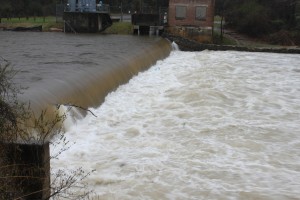
Cullowhee Dam. Photo by Bayleigh Davis
The story was originally published in The Sylva Herald on Feb. 21, 2019
by Dave Russell
The Sylva Herald has taken steps to pursue civil legal action against Western Carolina University. The actions came just prior to going to print Wednesday.
The Herald contends a report prepared by Asheville-based engineering firm McGill & Associates about removing the WCU-owned Cullowhee Dam is a public record as defined by a state transparency law.
The Herald first requested the WCU-held report Jan. 30.
WCU and the Tuckaseigee Water and Sewer Authority, the water provider for Dillsboro, Webster, Sylva and Jackson County, have water intakes above Cullowhee Dam. The small structure creates an impoundment on the Tuckaseigee River near WCU’s back entrance.
A July 2017 report by McGill & Associates recommended $900,000 in repairs. A partnering nonprofit, American Rivers, and WCU and TWSA sent McGill back to the drawing board to determine whether the dam could be removed without endangering water supply.
The Herald is seeking a copy of this second report.
Completed in December, the study says the dam could be removed, according to WCU Vice Chancellor for Administration and Finance Mike Byers.
When the Herald initially reported on the study, asking for a copy of the report, Byers refused. He said the report was in draft form and would not be finalized and released until the end of March.
American Rivers also refused to share the report, though as a nonprofit, they are not required to do so.
TWSA also has refused to release a copy.
A followup email requesting the report was sent Feb 12 to WCU Chief Communications Officer Bill Studenc. He said he would relay it to Byers and to the university’s lawyer.
On Feb. 13, Studenc told the Herald the lawyer would review the request the following week. Then, Studenc advised it would be March 4 before the Herald’s public record’s request would be taken into consideration.
“The university is diligently working to review the request and the related document,” Studenc said in a Tuesday email.
“Our legal affairs office has been exceptionally busy and needs time to evaluate the request. General Statue 132 (the N.C. Public Records Law) states that public bodies are required to respond to requests for public records ‘as promptly as possible,’ but does not define what constitutes ‘prompt.’
“Public officials are not required to set aside all their other duties to respond, as long as they do respond. We believe two weeks to review and respond is a reasonable amount of time.”
WCU is obligated to provide the document, and should have done so already, according to Amanda Martin of Stevens, Martin, Vaughn & Tadych, a law firm in Raleigh. Martin specializes in communications and first amendment law and serves as general counsel for the N.C. Press Association.
“The statute says that they have an obligation to provide you with public records as promptly as possible,” Martin said. “It doesn’t have an exact timeframe. It really depends on what the request is. If it’s an isolated document that can be given to you right away, then it should be given to you right away.”
A request for a document that might require removal Social Security numbers or banking information that required redactions would take longer, she said.
“In my opinion, the document you have requested fits in the former category instead of the latter,” she said. “I don’t think this is a document that could not be handed over right away.”
The report WCU received is marked as “Draft- Not for Distribution.” That has no bearing on its status as a public record, she said.
“The court has said that drafts of public records are public records. The court has directly addressed this,” she said. “This is not up for debate.”
WCU says the document is owned by American Rivers, not the university. Martin said that once a document is received by a public official, it is public record.
“Again, that is the law,” she said. “If you read the definition of a public record, it’s documents made and received by a public agency in connection with the transaction of public business.
“There is not any ambiguity there.”
There are exemptions, though they are to be narrowly construed, Martin said. “If, for example, the Coca-Cola company was providing a copy of the formula for Coke, that does not mean that they would have to release that,” she said.
Martin said legal action might be the only way the Herald can get the report.
“You can keep pushing and raising your request to higher and higher levels,” she said. “At the end of the day, if they still refuse, then your avenue is to file a public records lawsuit.”
“This seems to be a fairly straightforward situation,” she said. “Nothing described makes me think this is anything but a public record.”
Related stories:



